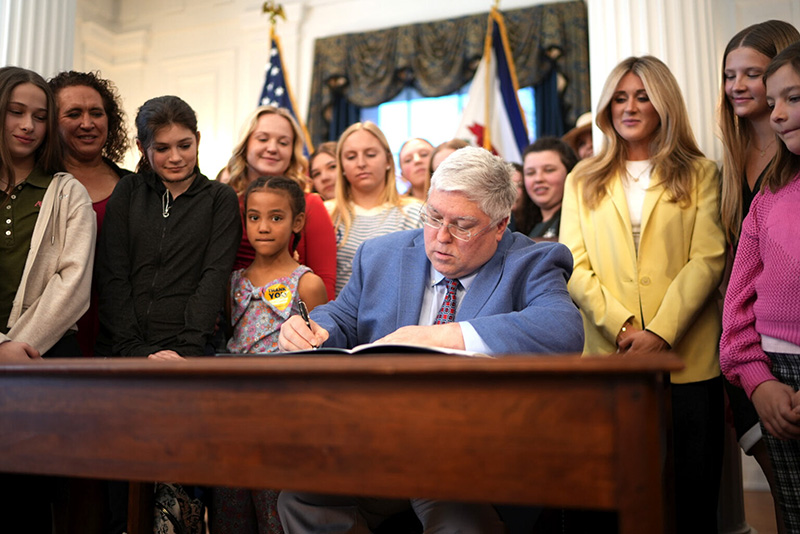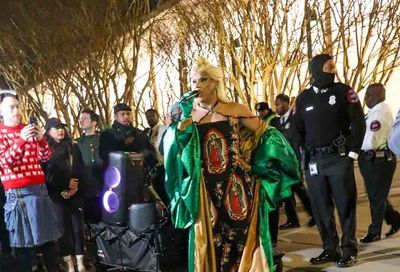Anti-LGBTQ Republicans sweep all three statewide races in Virginia, seize control of House of Delegates
Election Day victories are likely to put Virginia's LGBTQ community on defense for at least the next four years.

The LGBTQ community in Virginia will likely spend the next four years playing defense to prevent lawmakers from rolling back some of the progress the community made over the past two years, after Republicans dominated Tuesday’s elections.
The three Republican statewide candidates — Governor-elect Glenn Youngkin, Lt. Governor-elect Winsome Sears, and Attorney General-elect Jason Miyares, all of whom oppose LGBTQ equality in various forms — soared to victory, assisted by President Joe Biden’s sinking popularity ratings, frustration over the inability of Democrats in Washington to pass an infrastructure bill or any economic plans, a decrease in Black voter turnout, and a lackluster campaign run by Democratic nominee Terry McAuliffe that largely (and unsuccessfully) focused on tying Republicans to former President Donald Trump.
Meanwhile, Youngkin, in particular, focused heavily on rising food and gas prices, the need for tax cuts, and suburban voters’ angst over cultural issues, such as COVID-related shutdowns or mask mandates, concerns over crime (even as crime rates fell statewide) and contentious issues in schools — including the alleged political “indoctrination” of students, the alleged teaching of critical race theory, and the adoption of gender-affirming policies for transgender students.
With victories in the races for statewide office, Youngkin’s coattails carried over to the House of Delegates, knocking off six incumbents and allowing Republicans to gain control of the lower chamber of the General Assembly. In that case, the vehemently anti-LGBTQ Del. Todd Gilbert (R-Woodstock), a favorite of conservative groups who has railed against pro-equality measures, is likely to serve as Speaker of the House.
At least one of the already-called Republican pickups — in the seat belonging to Del. Martha Mugler (D-Hampton) — could be headed to a recount. Additionally, three other Democrats who appeared to survive on Tuesday night — Kelly Convirs-Fowler (D-Virginia Beach), Alex Askew (D-Virginia Beach) and Mike Mullin (D-Williamsburg) — could also be forced into recounts due to their slim margins of victory.
The number of out LGBTQ delegates in the House will decrease to three, with the defeat of Del. Mark Levine (D-Alexandria) in the Democratic primary and the loss of Joshua Cole (D-Stafford), who came out as LGBTQ after his election in 2019, to a Republican challenger. Delegates Dawn Adams (D-Richmond) and Danica Roem (D-Manassas) won hotly contested races while Delegate Mark Sickles (D-Franconia) won re-election easily. Sen. Adam Ebbin (D-Alexandria), who will be fourth remaining LGBTQ member of the General Assembly and is currently the Senate’s only LGBTQ member, was not up for re-election this year.
In terms of LGBTQ rights, it is unclear whether a Youngkin administration, an emboldened AG Miyares filing lawsuits against Democratic-approved laws, and a Republican-led House of Delegates would attempt to repeal or legally challenge some pro-equality pieces of legislation that became law over the past two years.
At risk could be the commonwealth’s LGBTQ-inclusive nondiscrimination law, a bill requiring schools to adopt inclusive policies for trans students, a ban on subjecting minors to conversion therapy to “change” their sexual orientation, or a law prohibiting the use of the “gay or trans panic” defense to justify the murders of LGBTQ individuals and allow perpetrators of anti-LGBTQ violence to receive reduced sentences.

The biggest obstacle to such repeals would appear to be the State Senate, which Democrats control by a 21-19 margin. But it remains to be seen whether Senate Democrats — who skew more moderate — would seek to appease Youngkin or House Republican leaders by allowing votes on pieces of legislation that might harm the LGBTQ community for the sake of congeniality. For example, the law requiring schools to adopt pro-trans policies to serve the needs of transgender students could be amended or repealed if Senate Democrats read Tuesday’s results as a rejection of their pro-LGBTQ policies.
A Republican-controlled House also effectively kills the chance of repealing Virginia’s Marshall-Newman Amendment, likely leaving it intact for the next decade at a minimum. To repeal the now-defunct ban on same-sex marriage — provided, of course, that Miyares does not attempt to enforce the law and challenge the Supreme Court’s 2015 marriage equality decision — lawmakers would have had to pass a bill to repeal it during the next legislative session in order to put it on the 2022 ballot for voter approval.
This is a developing story.
See also:
Supreme Court declines to hear Catholic hospital’s appeal of transgender patient’s lawsuit
Conservatives fume over Twix video featuring non-binary child
Florida teacher receives death threats after taking students to gay bar on field trip
Support Metro Weekly’s Journalism
These are challenging times for news organizations. And yet it’s crucial we stay active and provide vital resources and information to both our local readers and the world. So won’t you please take a moment and consider supporting Metro Weekly with a membership? For as little as $5 a month, you can help ensure Metro Weekly magazine and MetroWeekly.com remain free, viable resources as we provide the best, most diverse, culturally-resonant LGBTQ coverage in both the D.C. region and around the world. Memberships come with exclusive perks and discounts, your own personal digital delivery of each week’s magazine (and an archive), access to our Member's Lounge when it launches this fall, and exclusive members-only items like Metro Weekly Membership Mugs and Tote Bags! Check out all our membership levels here and please join us today!

























You must be logged in to post a comment.